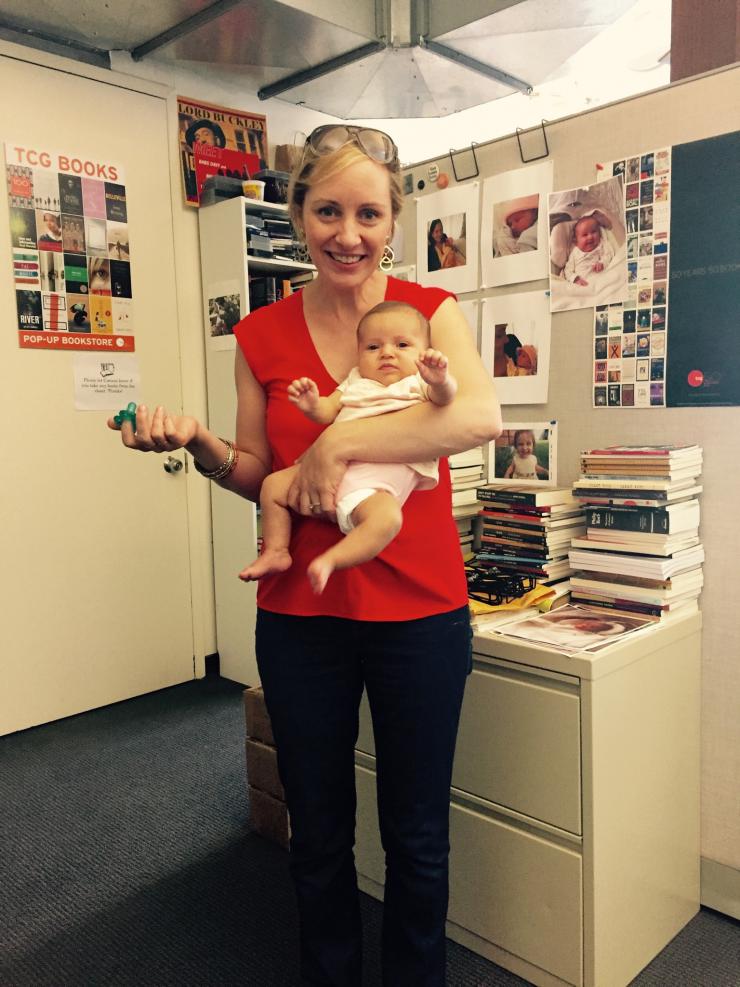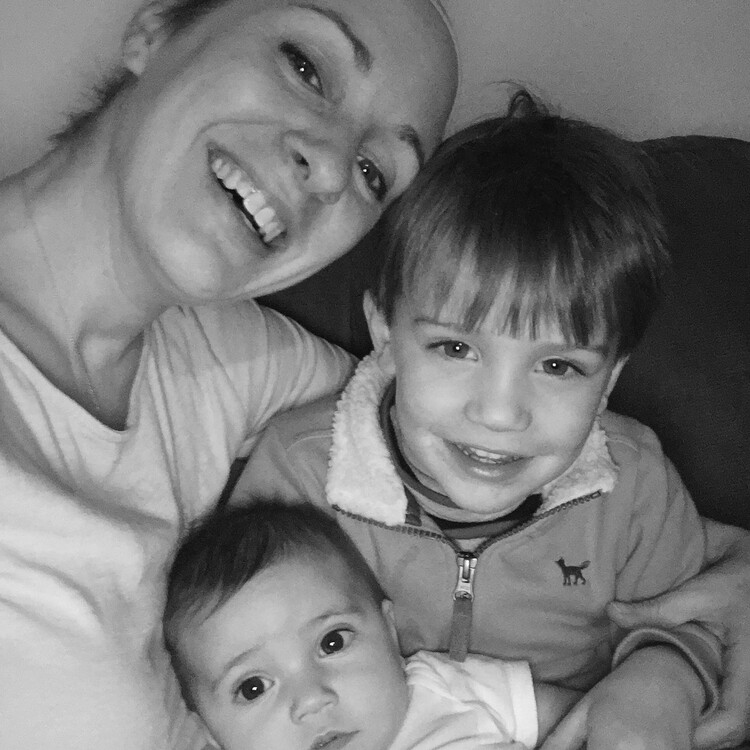Creating a Family-Friendly Work Environment
In the fight for diversity, equity, and inclusion, creating platforms that give voice to the nuanced experience of all parents will identify how the theatre culture at large can act to make better pathways back in for those left out of the discussion, thus directly affecting the pipeline, content, and population of our craft. The Parent Artist Advocacy League for the Performing Arts (PAAL) is a national resource hub and all-parent, all-discipline league advocating for a national standard of best practices for parents in the performing arts. This HowlRound series builds on the work of PAAL and will cover challenges faced by parent artists and offer some solutions and advice.—Rachel Spencer Hewitt, series curator.
“Theatre OR family.”
That was one of the responses to an article posted on the Theatre Communications Group (TCG) Facebook page—one that didn’t seem controversial until the comments started rolling in. The article, an interview with actor Romola Garai in the UK’s The Stage, contained an argument for making field-wide changes that would better support parents working in the theatre. The very first comment, which was met with heated debate, read: “If you choose to have children, you take the consequences. Don’t ask for special privileges just because you want kids.”
From artists to administrators to production staff who are parents, the struggle is career-threatening, it is exhausting, and for theatre mothers, it is intrinsically tied to gender equity in our leadership and in our programming.
To me, and to the founder and representatives of Parent-Artist Advocacy League (PAAL) for the Performing Arts, such assertions—and the underlying bias against theatre professionals who attempt to raise families—are why PAAL and similar initiatives are so desperately needed.
I’ve been all too aware of the stigmas felt by theatre parents since I started leading sessions at TCG Conferences (which I also produce, and yes, they’re family-friendly) around the challenges of parenting in our field. From artists to administrators to production staff who are parents, the struggle is career-threatening, it is exhausting, and for theatre mothers, it is intrinsically tied to gender equity in our leadership and in our programming.
The goal here is to provide a framework for creating family-friendly environments in the theatre. But first, let’s look at the why. After all, doesn’t the above commenter have a point? The theatre is historically labor-intensive by all accounts, and if you take the path of having kids, shouldn’t you be prepared to make the necessary sacrifices?
To move this conversation forward, we must agree on the deep patriarchal and capitalistic exploitation embedded in that question, and in the problematic “sweat equity”-reliant business model of our field. Moral imperative aside, it’s also just not the way the world is headed. Even corporate America, particularly the tech industry, has picked up on the value of taking care of your employees with families and investing in their well-being. It’s been covered that millennial workers insist on better work-life balance than their baby boomer supervisors. The future is family-friendly, and you’re either with us, or you’re left scratching your head in your ghost light, wondering where all the young people you hired five years ago went.
Now that we got that out of the way, I wanted to mention a couple of working assumptions for this piece, specifically:
1) Family-friendly policies should consider all kinds of caretakers. This post focuses on the specific needs of parents, but that is not meant to downplay the importance of other caretaking responsibilities.
2) Many of these recommendations may apply to any work environment, but focus on practices that will most support parents working on the staff of theatre organizations rather than freelance artists, because that’s where my knowledge and research is centered. I hope you’ll comment and write me or PAAL with more suggestions than I have room for here.
Let’s start with the macro view. There are some operating principles at play when considering new family-friendly work practices. No true change can be successful without:
1. Making space for this in the fabric of your organization. These changes are not about creating a budget line item, but thoughtfully undergoing a shift in organizational culture.
2. Creating dialogue with your colleagues. Spaces only become more inclusive if people talk about what they need from each other. If people don’t ask you what you need, tell them anyway.
3. Breaking down stigmas about parents (especially of young children) and their ability to perform, on our stages and off.
4. Understanding the moral and business imperatives. Non-profit theatres could stand to avoid turnover and advance equity and inclusion. Making employees feel valued in the totality of their lives is one way to lead this charge.
Now for the micro. So, what are some things you can do? Let’s go chronologically on the journey of building a family with some DO’s and DON’Ts for decision-makers.
Families don’t always start with pregnancy, but often they do. If that’s what’s happening with a woman in your work environment:
- DO give her more space, literally and figuratively. Provide a private place to rest. Offer her more frequent breaks, and more time to move between places and meetings.
- If you have a parking lot, DO give her a reserved spot close to the entrance. Offer her a footrest. Ask her about specific accommodations she might need.
- But DON’T assume she is incapable of doing something unless you ask her about her comfort level first. Pregnancy autonomy is especially important for our field’s production staff.
- DON’T comment on her appearance, be the first to bring up her pregnancy all the time, or ask her if she’ll be coming back to work after she has the baby. Just...don’t.
For any expecting parent in your organization, including fathers and adopting parents:
- DO work with them on a plan for leave and their transition into and out of leave, and offer at least twelve weeks. Be supportive, and put their needs first.
- DO attempt to pay them, even at partial salary, for their leave. A 2012 TCG snapshot survey of one hundred and fifty-four theatres found that thirty-seven specifically offered paid maternity leave and twenty-eight offered paid paternity leave. (Did all those theatres offer paid parental leave regardless of stored-up vacation time and short-term disability? No. But they should.)
- DON’T contact them while they’re on their leave. They’re busy figuring out how to keep a tiny person alive.
After the arrival of their child, once they return to work:
- DO create a space for pumping, if they need it. Not all parents nurse, but take this opportunity to create the space for any future employees or artists. What does this space need? Ask Cleveland Play House (CPH), or TCG, both of whom call this their multi-purpose privacy space. Otherwise, there are plenty of online resources.
- DO open up the conversation about a flexible “in office” work schedule. Parents’ needs and schedules vary. Consider telecommuting as an option, even if it’s not your norm.
- For artists, DO consider the possibility of an adjusted rehearsal schedule. If you worry that the work can’t get done with a more family-friendly rehearsal set-up, talk to Ten Thousand Things or True Colors Theatre Company. Also, aim to get schedules out with plenty of advance notice, and minimize last-minute changes for those who have to arrange childcare.
- If being at the office all the time is a must for their job, DO let them bring their kid to work in tight childcare spots. How might that go? Ask Baltimore’s Center Stage, or again, CPH about their Flory Family Room.
- For visiting artists or production staff, DO support them with childcare needs, including a two-bedroom housing accommodation if possible. At the very least, have recommendations of local caregivers, and ideally, pay for some or all of it. Get creative, ie. babysitters who would work for show tickets, anyone?
- DO give them some breathing room as they adjust to being a working parent. They may still need naps, and some time to get into their groove. Because once they do, they will shine.

Even if you don’t have a single employee on the family track, launch a committee, roundtable, or series of brown bag lunches to discuss what your organization can do to address family needs, and the work-life balance of employees and visiting staff.
Even if you aren’t a decision-maker, or on the family track yourself, start the conversation. These incremental steps can be just the beginning of a larger paradigm shift.
Even if you put some or all of these changes into effect and they seem rarely utilized, at least you’ll be the kind of organization that made them.



Comments
The article is just the start of the conversation—we want to know what you think about this subject, too! HowlRound is a space for knowledge-sharing, and we welcome spirited, thoughtful, and on-topic dialogue. Find our full comments policy here
I cannot tell you how much this is appreciated. Thank you, Devon!
There is also a great podcast on this topic but with respect to workplaces in general on The Longest Shortest Time - it’s #143 focuses largely on the company Badger...
Yes! Thanks for sharing this - I'm a big fan of that podcast. I also want to shout out Patagonia. They are like the family-friendly bar that all companies should be measured against.
https://work.qz.com/806516/...
Love this!
Thank you for this article! I know we have a long way to go in these pursuits (and particularly in overcoming stigmas) but having the conversation is a crucial first step. And thanks for these terrific, actionable suggestions. I hope they'll be put to use!